Eventrückblicke

The two-day workshop initiated by media artist & researcher Connor Cook , ‘Planetary Times’ summer fellow in the Planetary Scholars & Artists in Residence Program, took place in collaboration with Kunsthalle Giessen from 28-29 May 2024. Cook along with his collaborator Darren Zhu (synthetic biologist) conducted a transdisciplinary workshop on the theme “ Bioreactors & Biospheres: An Audiovisual Exploration of Evolution as Planet-building ”. The workshop took the participants through what they call “the informatic evolution of the planet”: Starting the discussion on the origins of life in the emergence of single-cell and multicellular organisms and delving into the emergence of complex species, Cook and Zhu argued that Artificial Life (A-Life) and Artificial Intelligence (AI) continue this evolutionary lineage.
The open public event craftily combined the theory and philosophy of computational and evolutionary biology with an artistic performance. The events included a roundtable discussion, a film screening, a hands-on experiment with the video game software Unreal Engine taking input from a Raspberry-Pi enabled bioreactor (Pioreactor), and an audiovisual performance by Cook on the “bios-technosphere.”
Day one of the workshop set the theoretical and scientific foundation for the transdisciplinary project of Cook and Zhu who invited three experts to the roundtable discussion on the topic “Informatic Evolution of the Planet”. The evolutionary lineage that weaves together biosphere and technosphere through informatic feedback loops was discussed at length by Dr. Cécile Malaspina (Collège International de Philosophie, Paris), Dr. Jochen Blom (JLU) & Christina Lu (Oxford University) representing the fields of philosophy of science, computational biology, and AI research, respectively.
A warm welcome by Nadia Ismail (Director, Kunsthalle Giessen) and Liza Bauer (Interim Scientific Manager, Panel on Planetary Thinking) and an introduction to the concept of Planetary Thinking by Claus Leggewie (Director, Panel on Planetary Thinking) kick-started the workshop. Cook commenced the discussion by explaining his work and specifically the project he carried out during the three-month fellowship where he used the game engine Unreal to create distinct environments that enabled the manipulation of information into different formats, thus creating a connection between biological and technological spheres. Stating that, today, information is used synonymously with digital information; Cook explained his interest in situating the emergence of computation and digital information along a much broader evolutionary trajectory that began with the origin of life on Earth.
Cook’s collaborator Zhu explained what piqued their research interest to chart the historical evolution of information. Taking inspiration from the seminal work of John Maynard Smith and Eors Szathmary, ‘ The Major Transitions in Evolution ’ (1995), which explains the informatic increase in complexity across different Phase Changes in evolution, Zhu pointed out their overarching questions; does Artificial Life too represent these kinds of evolutionary transitions? How can we think of A-Life in terms of individuality and information processing?
Continuing the discussion on a philosophical trajectory, Dr. Malaspina talked about what information really means by drawing inspiration from the ‘Theory of Individuation’ put forward by philosopher Gilbert Simondon . As the theory states, information neither depends on the sender’s message and intention nor the receiver’s interpretation of it but it has to be explained in terms of ontogenesis . Attributing this essential biological concept that tracks the lineage of an individual and delves into the history of a species, Simondon states that the “information is whatever catalyzes the pre-individual system into a process of ontogenesis.”
Delving into the hard sciences, Dr. Blom discussed his work which is primarily on comparative genomics of bacteria and how the information flow in bacteria takes a similar evolutionary path as other biological species, constantly exchanging information about the natural world around them in recursive feedback loops that involve mutation and selection. The discussion shed light on the race that exists between the computer capacities ( Moore’s Law ) and sequencing capacities where the latter develops at a much faster rate than the former which brings challenges to bio-mathematicians as Dr. Blom who builds computational tools aligning biological sequences.
The discussion on the temporal, evolutionary trajectory of information from the past to the present took a futuristic turn with inputs from Lu who discussed how her work on AI draws inspiration from biology such as the multiscalar architecture of biological organisms. Thinking of what wants to be in existence rather than what is in existence, her hypothesis stated that the existing machinery models are incapable of evolution and create an ontological stasis of the information they produce. Synthesizing the biological evolution of these existing models, she discussed how AI could lead the next Phase Change in informatic evolution.
The discussion wrapped up after a lively Q&A session where the interdisciplinary audience actively engaged to agree and debate with the panel. Day one closed successfully after the screening of Cook & Zhu’s movie Xenoplex (or the Xenobiology Multiplex) . The computational simulation is a speculative experimental design that leverages the most recent transition (planetary computation) to elucidate the first transition (origins of life).


Day two of the workshop started with Cook conducting an intensive practical session, giving 1:1 support to the participants on how to create audiovisual worlds using the Unreal Engine. The participants got to experience firsthand the challenges and mental acuity needed to create complex computational worlds. The workshop was focused on replicating planetary dynamics on a micro-scale using the Raspberry Pi-enabled bioreactor (Pioreactor) that cultivated, monitored, and controlled cultures of algae to create immersive audiovisual worlds. By algorithmically adjusting and monitoring the balance of light, nutrients, carbon dioxide, and algal growth, the Pioreactor acted as a simplified planetary model, illustrating the intricate interplay of biological matter, energy, and information within the Earth system. Connecting the Pioreactor to the Unreal Engine, the participants used the real-time data produced by algae as input to create their own vibrant, audiovisual worlds.


The workshop ended with an artist’s talk and a spectacular audiovisual performance by Cook that he had developed using the Unreal Engine which transported the audience to a bios-technosphere. Most of the audience who also participated in Cook’s super-intensive worldbuilding session earlier was especially in awe of the performance. The Planetary Times summer workshop wrapped up successfully with a cocktail and finger food reception.
Our gratitude goes to our fellow Connor Cook and his collaborator Darren Zhu, our valuable collaborators at Kunsthalle Giessen, the panel of experts of the roundtable discussion, and Veganatural for making this a huge success!
Reports on the event covered by the local newspapers can be found here .

|

|
This year’s ‘Planetary Spaces’ fellow in the Planetary Scholars & Artists in Residence Program , Juan Pablo Pacheco Bejarano , took us on a journey to understand our relationship to the ocean floor, and what it can teach us about our chances for survival in the face of conditions such as microplastic pollution and ocean acidification. To address this from the coastless city of Giessen, Pacheco Bejarano’s three-day wet workshop created an open (in)disciplinary space to relate to the multiple bodies of water within and around us. Following the workshop, a complementary audio-visual installation was showcased at Neuer Kunstverein Giessen on November 10, 2023.
The workshop kick started with a guided tour of Lahnfenster Hessen , the observation station at a fish pass in Giessen. Here, the participants were educated on the migratory patterns of the fish such as the eel that travels across the Atlantic, the aquatic birds such as the kingfisher that nests by the river bank as well as the changing water- and riverscape of the Lahn through the years where we learned about the infrastructures that allow river species to live alongside a dam. The tour offered a glimpse to the underwater world of River Lahn through the large windows installed to observe the fish in their natural environment. Pacheco Bejarano then conducted a somatic reading session from his wet reader that dealt with the issues of hydrocommons and colonialism. The day came to an end with the group taking a relaxing walk by the Lahn whilst deep listening to the river using a hydrophone.
The second day of the workshop took the group to the aquarium Ocean2100 at the Systematics & Biodiversity Lab of the JLU. Prof. Dr. Thomas Wilke gave an introduction to the aquarium; a global change simulator that exposes stony corals and other organisms living in coral reefs to global change scenarios. He emphasized on the importance of artists creating a transdisciplinary discourse to carry the important scientific messages of conservation of corals to the wider public. Dr. Patrick Schubert then gave the group a guided tour of the aquarium. The group engaged in a somatic reading session at the aquarium before going to the Bergwerkswald ponds, bodies of water that emerged out of bomb craters from World War II. Here, the participants got an opportunity to write a toxic love letter to their favorite body of water. The day wrapped up with a lecture by Prof. Dr. Klement Tockner (Senckenberg Society on Nature Research) on ‘Water as an Engineered Planetary Space’ at Kunsthalle Giessen .
On the final day of the workshop, Pacheco Bejarano conducted floating and underwater communication exercises at the indoor swimming pool at Giessener Bäder . The workshop came to a conclusion with the somatic dance exercise led by Colombian choreographer Catalina Insignares through which participants connected to their bodies as liquid tissues and to the watery origins of life. The sensorial experience was complemented with Pacheco Bejarano’s performance of the waterphone (Ocean Harp) that emanated a vibrant, ethereal sound.
Our sincere gratitude goes to Juan Pablo Pacheco Bejarano, our group of participants, staff at Lahnfenster Hessen, Prof. Wilke, Dr. Schubert, the research team of aquarium Ocean2100, Catalina Insignares, and to MAGIE Makerspace for the support given to make the workshop a massive success!

|

|
Strategien und Maßnahmen zur Wiederherstellung bedrohter Lebensräume für Menschen und Tiere erfordern vertiefende Kenntnisse über diese konfliktbehafteten Orte. Im Zuge ihrer zweitägigen Workshop-Reihe im Schloss Rauischholzhausen (01.-02.06.2023) riefen die diesjährigen Fellows im Planetary Scholars & Artists in Residence Program dazu auf, einen planetaren Blick auf drei sehr unterschiedliche Orte zu werfen: Den durch den Klimawandel und andere Faktoren stark bedrohten Tschadsee, die japanische Sperrzone in Folge des Atomunglücks bei Fukushima, sowie ein hessisches Waldstück bei Biebertal. Im Zuge von Vorlesungen, Diskussionsrunden, Workshops sowie einer Miniatur-Ausstellung lieferten Adenike Oladosu und Jason Waite zwanzig Teilnehmer:innen Einblicke in die Auswirkungen langfristiger Umweltkatastrophen auf planetare Räume und deren menschliche und nicht-menschliche Bewohner:innen. Eine umfassende Kunst-Installation zu den Projekten der Fellows sowie zu den Ergebnissen des Workshops wird am 06. Juli um 18:00 Uhr in der Kunsthalle Gießen feierlich eröffnet.
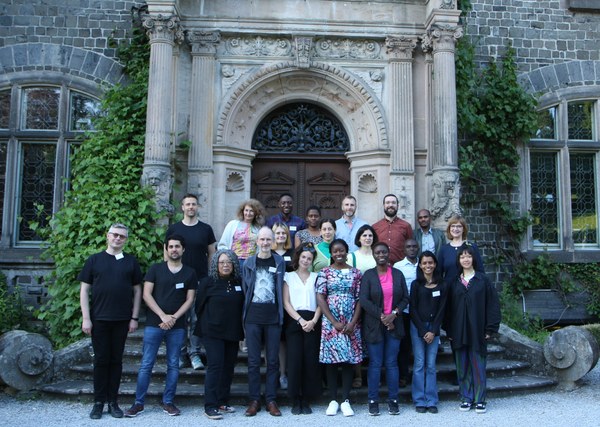
Orte, die verschwinden: Vom einstigen Mega-Tschadsee zum rapide schrumpfenden Tschadsee von heute
Am Morgen des 01.06.2023 machte sich die gemischte Gruppe aus rund 20 Teilnehmer:innen gemeinsam auf den Weg nach Ebsdorfergrund, um sich im Schloss Rauischholzhausen einzufinden. Teil der gemischten Gruppe aus Kunst- und Veterinärmedizin-Studierenden, Doktorand:innen verschiedener Fachrichtungen sowie dem Kern-Team des Panels war ebenso ein Vorreiter im Bereich planetaren Denkens, Prof. Dr. Bronislaw Szerszynski (Lancaster Universität, Vereinigtes Königreich). Dieser hatte die Veranstaltungsreihe am Vorabend mit seiner Planetary Lecture-Performance zum Thema „Drift as a Planetary Phenomenon“ eingeläutet. „Es ist etwas wirklich besonderes für mich, so intensiv mit einer Gruppe planetaren Denker:innen zusammenarbeiten zu können,“ so eine Doktorandin des Rachel Carson Centers der LMU München, die sich in ihrer Dissertation mit dem Konzept „Planetary Health“ auseinandersetzt.
Der Vormittag im Schloss war dem Thema „Shrinking Spaces: From Mega-Chad to Lade Chad“ gewidmet. Die Nigerianische Klimaaktivistin Adenike Oladosu (I Lead Climate Action) machte den Teilnehmer:innen über Satellitenaufnahmen deutlich, wie rapide der Tschadsee seit den 1960ger Jahren an Umfang verloren hat. Im Anschluss lieferte sie vertiefende Einblicke in die vielschichtigen sozialen und ökologischen Konflikte rund um den See, der die Lebensgrundlage für unzählige Menschen darstellt. Um einem kompletten Verschwinden des Tschadsees entgegenzuwirken, ruft Oladosu für mehr Verantwortung im globalen Norden in der Bewältigung der Klimakrise auf, da diese maßgeblich zum Austrocknen des Tschadsees beiträgt. Zu Gast war ebenso Dr. Patrick Flamm vom Friedensinstitut Frankfurt am Main, der den Programmpunkt mit Forschungsergebnissen aus der Friedens- und Konfliktforschung anreicherte.
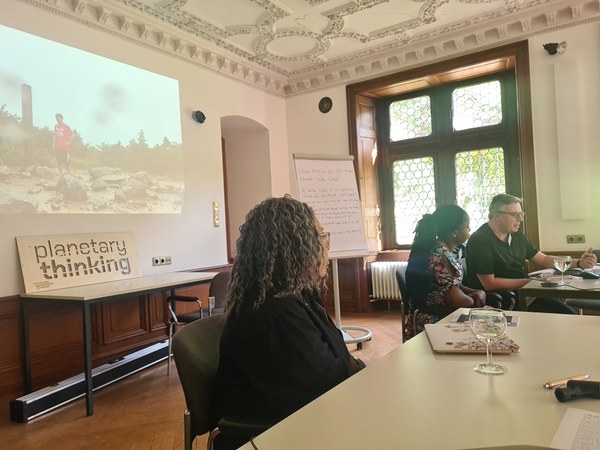
Ein besonderes Highlight der Workshop-Reihe fand am Abend des ersten Tages statt: Oladosu und Waite diskutierten gemeinsam mit Claudia J. Ford (SUNY Potsdam, USA), Alumna des Fellowship Programms aus dem letzten Semester, wie sich der Verlust geschätzter Orte in Form von Klimatrauer auf die Psyche der Menschen auswirken kann. Veranschaulicht wurde die Diskussion im Zuge einer Miniatur-Ausstellung im Obergeschoss des Schlosses: Zum Sonnenuntergang konnten sich die Teilnehmer:innen über eine Posterausstellung, eine Video-Installation, eine VR-Simulation, sowie über Fords Klimatrauer-Tagebuch noch einmal praktisch mit den Themen der Workshop Reihe auseinandersetzen.
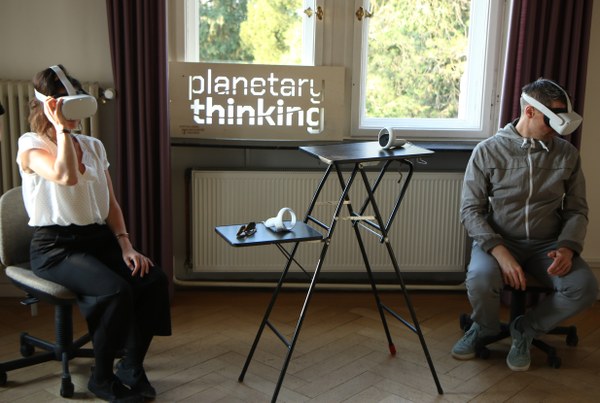
Mehr-als-menschliche Anpassungsstrategien an toxische Räume: Von Fukushima bis Hessen
Der zweite Tag rückte die nicht-menschlichen Bewohner des Planeten Erde in den Fokus: Der in Oxford ansässige Kurator und Kulturschaffende Jason Waite (Don't Follow the Wind) stellte den Teilnehmer:innen erstaunliche Wildkamera-Aufnahmen aus dem Sperrgebiet um Fukushima vor, die sich eine Vielzahl von Säugetieren in der Abwesenheit der Menschen zum Zuhause gemacht haben. Gemeinsam mit seinem Gast und Wildschweinexperten Dr. Kieran O’Mahony (Tschechische Akademie der Wissenschaften) stellte er außerdem interessante Bezüge zu einem hessischen Waldgebiet bei Biebertal her: Im Vergleich zeigten die Wildschweinaufnahmen aus Fukushima und Biebertal zur Verwechslung ähnliche Bilder der besonders widerstands- und anpassungsfähigen Tiere, denn die europäischen Wildschweine sind eng mit den japanischen verwandt.
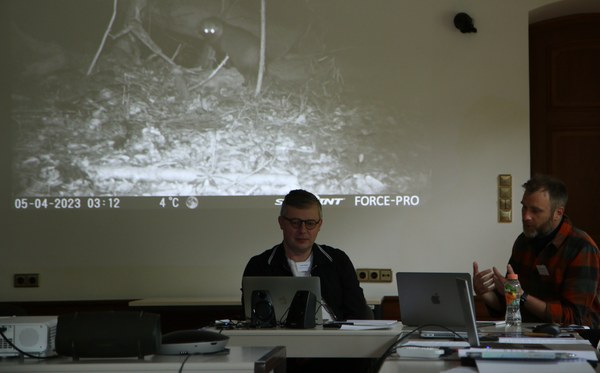
Abgerundet wurde das Programm durch einen gemeinschaftlichen Zeichenworkshop zum Thema „Imagining More-Than-Human Infrastructure“. Hier war die Fantasie der Teilnehmer:innen gefragt, während sie gemeinsam Skizzen dazu anfertigten, wie eine Farm bei Fukushima umgestaltet werden könnte, um Menschen und Tieren ein gemeinsames Zuhause zur freien Entfaltung zu bieten. Liza Bauer, die stellvertretende Geschäftsführerin des Panels, bemerkte sie könne aus den Rückmeldungen der Teilnehmer:innen schließen, dass es dem Panel mit der Workshop Reihe wirklich gelungen sei, Raum für den interdisziplinären Austausch unter Forschenden und Kunstschaffenden unterschiedlicher Karrierestufen zu schaffen. „Das freut uns ganz besonders – wir danken unseren Fellows für das vielseitige Programm, das sie zusammengestellt haben.“
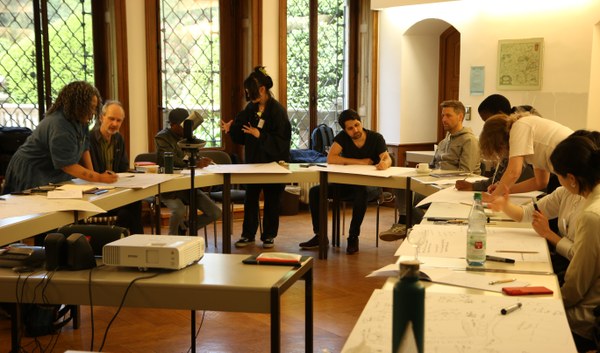
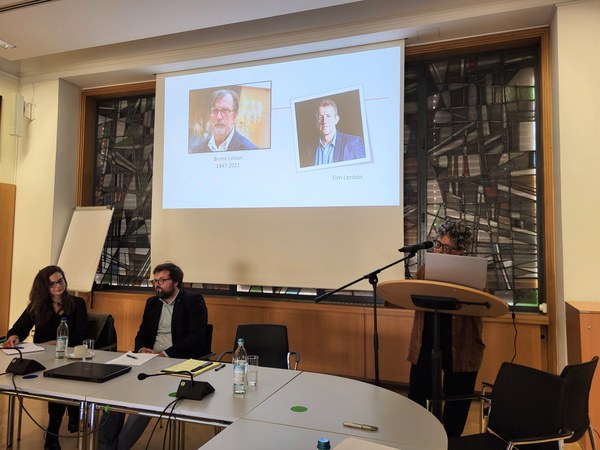
|
|
Die Workshop-Reihe " What Earth is Made of " unserer Gastwissenschaftlerin Claudia J. Ford fand dieses Jahr am 18. Oktober und am 10. - 11. November 2022 statt. Die Veranstaltungsreihe reflektierte James Lovelocks Gaia-Hypothese aus einer indigenen Perspektive, mit dem Ziel, unser Verständnis von planetarischen Materialien und ihren Konstellationen durch Kunst und Wissenschaft zu vertiefen. Dabei verknüpften die Veranstaltungen indigene Vorstellungen von Ökologie mit der Klimakrise und bezogen die Teilnehmer:innen mit allen Sinnen ein – etwa durch praktische Arbeit auf einem ökologische Bauernhof, einem gemeinsamen Filmscreening, in kreativem Schreiben, sowie durch Vorträge und Dialoge und zuletzt eine Ausstellung mit visueller Kunst, die vom Klimawandel und planetaren Materialien inspiriert wurde.
Die Workshopreihe begann am 18. Oktober mit einer Exkursion zum Gladbacherhof der JLU. Im Mittelpunkt stand eine der grundlegendsten Beziehungen zwischen Mensch und Umwelt - die Lebensmittelproduktion und Ernährung.
Am 10. November hielt Ford zunächst eine anregende Hybridvorlesung über indigenes Wissen und die Gaia-Hypothese. Der Vortrag erinnerte an James Lovelock (1919 - 2022), der in den 1970er Jahren zusammen mit Lynn Margulis (1938 - 2011) die Gaia-Hypothese formulierte. Ford erinnerte daran, dass die Erde ein Lebewesen ist, das sich in einem empfindlichen Zustand des Gleichgewichts und der Harmonie befindet und zu dessen Wohlergehen wir alle verpflichtet sind. Sie würdigte auch den französischen Philosophen und Anthropologen Bruno Latour (1947 - 2022), dessen Ideen in sehr vielen Punkten mit Lovelocks Gaia-Theorie übereinstimmen. Ford wies darauf hin, dass diese geschätzten Denker es versäumt hätten, darauf hinzuweisen, dass ihre Vorstellungen von der Erde als einem globalen, in sich abhängigen System gar nicht so neu seien. Schon Jahrtausende vor Lovelocks Überlegungen haben indigene Denker:innen und Geschichtenerzähler:innen darüber nachgedacht, wie die Erde als lebendiges, selbstbewusstes System zu Rückkopplung und Selbstkorrektur fähig sein könnte, insbesondere bei der Selbstregulierung des Klimas.
Ford betonte, dass angesichts der aktuellen Klimakrise die Geschichten, die wir über die "Natur" erzählen, von globalen zu planetaren Vorstellungen wechseln müssen. Um dies zu erreichen, rief sie dazu auf, das bereits vorhandene indigene Wissen in der westlichen Wissenschaft anzuerkennen und zu nutzen, da es alternative Paradigmen bietet, die wirklich transdisziplinär sind. Die umfangreiche Bibliographie, die sie für ihren Vortrag recherchiert hat, finden Sie hier .
Im Anschluss an den Vortrag wurde der Dokumentarfilm " Inuit Knowledge & Climate Change " (2010) gezeigt, der erste Film in Inuktitut-Sprache unter der Regie von Zacharias Kunuk und Ian Mauro. Der Film nahm die Zuschauer mit auf eine Reise mit den Ältesten und Jägern der Inuit und erforschte dabei die sozialen und ökologischen Auswirkungen der Erwärmung der Arktis. Der Tag endete mit einem informellen Beisammensein im Planetary Hub, wo das Gremium und die Gäste den Abend mit veganem Fingerfood und angenehmen Gesprächen ausklingen ließen.
Am 11. November führte Ford einen Schreibworkshop durch, um Klimatrauer durch Kunst Ausdruck zu verleihen. Die Teilnehmer:innen bekamen die Gelegenheit, sich in kreativem nicht-fiktionalen Schreiben über ihren Umgang mit dem Gefühl der Klimatrauer zu versuchen. Dabei konnten sie unter Anderem Materialien aus ihrer unmittelbaren Umgebung als Anregung nutzten. Anschließend erhielten die Teilnehmenden die Möglichkeit, ihre Texte vorzutragen.
Am Abend fand die Workshop-Reihe mit einer feierlichen Eröffnung der Ausstellung "Planetary Origin Stories" ihren Abschluss. Im MAGIE - Makerspace Gießen wurde Collagen gezeigt, die Ford während ihres Aufenthalts am Panel erstellt hatte. Mehr Impulse eröffnete den Empfang mit einem Konzert, danach erläuterte Ford in einem Künstlergespräch ihre Inspiration für die Ausstellung. Diese war eng mit dem Thema der Umweltzerstörung und der Klimakatastrophe verwoben – Entwicklungen, die zumeist als unangenehm empfunden werden. Dagegen zollte die Eleganz und Raffinesse von Fords Werken den Farben, Formen und Gestalten der natürlichen Welt Tribut und ihre Werke erzählten von unserer kollektiven Verantwortung, die Schönheit und die Ressourcen der Erde zu schützen.
Unser aufrichtiger Dank gilt Claudia für die Konzeption dieses vielseitigen Programms, ebenso wie unseren begeisterten Teilnehmer:innen und Johannes und dem Team des Makerspace Gießen für ihre Unterstützung, die diese Workshop-Reihe gemeinsam zu einem großen Erfolg gemacht haben!

|

|
|
Um dem anhaltenden Verlust an genetischer Vielfalt auf dem Planeten effektive Maßnahmen entgegenzusetzen, sprechen sich immer mehr Stimmen für eine feste Verankerung von Rechten der ›Natur‹ in westlichen Rechtssystemen aus. Fragen danach ob, wie und warum die unzähligen tierlichen, pflanzlichen, mikrobiellen und andersartigen Bewohner:innen des Planeten die Politik mitgestalten können beschäftigte unser Panel im planetaren Kolloquium. In seiner Einstiegs-Keynote „Welche Rechte braucht die Natur?“ zeichnete der Soziologe Frank Adloff (Universität Hamburg) zunächst die Entwicklung unterschiedlicher Konzeptionen von Rechten für Tiere, Pflanzen, und Ökosysteme nach. Schnell wurde deutlich, dass westlich geprägte Debatten um Nachhaltigkeit, Umwelt-, oder Tierschutz bislang weit davon entfernt sind, den intrinsischen Wert nichtmenschlicher Lebensformen anzuerkennen. Adloff schlägt daher einen „methodologischen Animismus“ vor: Ausgehend des Grundprinzips vieler indigener Kulturen, nach dem alle planetaren Bestandteile als belebt und beseelt verstanden werden, könnten Lebewesen wie Würmer, Pilze, oder Flüsse programmatisch als Quasi-Subjekte begriffen werden. Er kombiniert so die indigene Kosmologie mit einem westlichen Rechtsverständnis, sodass sich nichtmenschliche Lebensformen als kollektive Rechtssubjekte zusammenfassen lassen. In Antwort zu Adloff zeigte die Soziologin Doris Schweizer (Goethe Universität Frankfurt) Schwierigkeiten in Verbindung zur Übertragbarkeit menschlicher Rechtskonzeptionen auf nichtmenschliche ›Rechtspersonen‹ auf. Obgleich Sie das politisches Potenzial hinter der Idee anerkennt, können Rechtssysteme ihre anthropozentrische Ausrichtung lediglich relativieren, nicht jedoch gänzlich überkommen. Anschließend warf Ökosystemforscherin Emily Alice Poppenborg (JLU Giessen) weitere Zweifel auf: Menschliche Gesellschaften seien heutzutage so eng in die Funktionsweisen von Ökosystemen verstrickt, dass der Begriff ›Natur‹ in Poppenborgs Forschung gar keinen Gebrauch findet; außerdem untermauere er fehlgeleitete Vorstellungen einer Trennlinie zwischen ›Kultur‹ und ›Natur‹. Dennoch konnte Juristin Franziska Johanna Albrecht (Green Legal Impact, Berlin) zeigen, dass Rechte der ›Natur‹ – so unvollkommen sie auch sein mögen – als effektive Werkzeuge im Sinne der Repräsentanz nichtmenschlicher Interessen eingesetzt werden können. Erst am 3. Oktober 2022 wurde die spanische Lagune „Mar Menor“ zur ersten natürlichen Rechtsperson in Europa erklärt. Ob dieser Status dem immens bedrohten Ökosystem tatsächlich aus der Krise verhelfen wird bleibt abzuwarten und wird bereits von Expert:innen in Frage gestellt (cf. Soro Mateo und Álvarez 2022) . In den Versuchen, das Konzept der ›Natur als Rechtsperson‹ weiter auszureifen um es effektiv in die Praxis umzusetzen, stellen indigene Modelle zweifelslos Vorreiter zur Orientierung dar. Rechte der ›Natur‹ können und sollten in diesen Versuchen jedoch keinesfalls als ein Allheilmittel gegen anthropozentrisch ausgerichtete Politik verstanden, sondern immerzu kritisch hinsichtlich ihrer Motivationen hinterfragt werden. Als stets weiter auszufeilende Werkzeuge können Sie jedoch zur Relativierung anthropozentrischen Denkens beitragen – und so vielleicht dem Artensterben entgegenwirken. |
Eine Aufnahme des hybriden Kolloquiums wird in Kürze über unseren Youtube Channel verfügbar sein.
|
|
Am 27. Oktober besuchte das Panel das von der Stiftung Kunst und Natur geförderte Museum Sinclair-Haus , um die internationale Ausstellung Ewiges Eis zu besuchen. Die Ausstellung zeigte ausgewählte Werke zeitgenössischer Künstler, die die kulturellen, politischen, sozialen und sonstigen Zusammenhänge der globalen Eisschmelze darstellten. Auch die Auswirkungen der Schmelze auf lokale indigene Gemeinschaften und auf das Weltklima als Ganzes wurden thematisiert. In der Ausstellung erlebten wir eindrucksvolle sensorischen Erfahrungen vermittelt durch visuelle und auditive Mittel, wie etwa Stickerei, Fotografie und Videoinstallationen. Gezeigt wurden u. a. die Stickereiarbeiten der schwedischen Sámi-Künstlerin Britta Marakatt-Labba, die von den Geschichten der lappländischen Rentierzüchter im hohen Norden erzählten. Ebenso wurde eine kurze Videokollaboration mit dem Titel Rise: From One Island to Another zwischen der Dichterin Kathy Jetn̄il-Kijiner von den Marshallinseln und der Autorin Aka Niviâna aus Kalaalit Nunaat (Grönland) ausgestellt.
Unser besonderer Dank gilt Madelaine Heck für die anregende Führung durch die Ausstellung! |
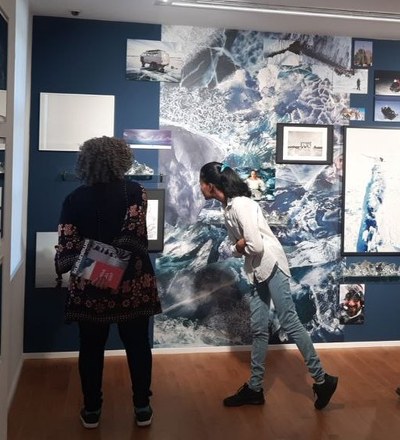
|
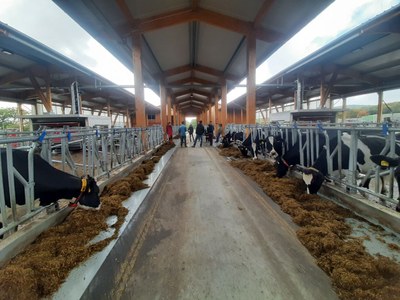
|
|
Am 18.10 fand die Kickoff-Veranstaltung für die Workshop-Series “ What Earth is made of? ” unseres Fellows Claudia Ford statt. Die Veranstaltungsreihe verbindet verschiedene Perspektiven aus angewandten Bereichen, der Wissenschaft und der Kunst in einem Versuch, unser Verhältnis zur Erde und ihren Materialitäten neu zu denken. Im ersten Workshop lag der Fokus auf einer der fundamentalsten Beziehungen zwischen Mensch und Umwelt - die der Nahrungsproduktion und der Ernährung. Dazu führte uns unsere Exkursion auf den Gladbacherhof , der Ökolandwirtschaft und Forschung verbindet: auf dem produktiv wirtschaftenden Ökolandbaubetrieb wird in Kooperation mit der JLU Forschung betrieben, um Ökolandbau neu zu denken und zukunftsfähige Konzepte zu entwickeln.
Der Tag startete mit einer Tour durch den neu erbauten Milchviehversuchsstall. Mit Hilfe eines Melkroboters und eines vollautomatischen Fütterungs- und Reinigungssystem erforschen die Mitarbeiter:innen des Green Dairy Projekts wie Klimagasemissionen im Ökolandbau reduziert, und das Maß an Selbstbestimmung und Bewegungsfreiheit der Tiere dabei gesteigert werden kann.
Nach einem mit hofeigenen Produkten durch Veganatural zubereiteten Mittagessen wurde sich in wissenschaftlichen Vorträgen mit diversen Themen auseinandergesetzt. Neben Überlegungen zu Entscheidungskriterien für Landwirte im Umgang mit nachhaltigen Technologien wurden auch neue Ansätze in der Agroforstwirtschaft und ein Plädoyer für mehr Fürsorge in der Landwirtschaft im Sinne des 'Biodynamic Farming' diskutiert. Auch fand eine Führung durch die sich vor Ort befindlichen Laborräume statt.
Zuletzt durften die Teilnehmer:innen die im Vortrag vorgestellten Techniken der Agroforstwirtschaft in Anwendung betrachten. Philipp Weckenbrock stellte der Gruppe das Agroforstprojekt des Hofes vor und erklärte im Detail, wie dabei über bestimmte Pflanzungsstrategien versucht wird, mehrere Ebenen der Nahrungsmittelproduktion in einem zusammenhängenden System anzuordnen. In den Versuchaufbauten des Hofes wird dabei konkret die Produktivität von Mischsystemen zwischen Bäumen und klassischen landwirtschaftlichen Kulturen wie z.B. Getreide oder Kartoffeln untersucht. Obwohl sie in der Praxis bisher wenig Anwendung finden, versprechen Agroforstsysteme einige Vorteile, beispielsweise eine stärkere Resilienz und Widerstandsfähigkeit gegenüber klimatischen Veränderungen, Erosion und eine erhöhte Wasserspeicherkapazität des Bodens.
Die Exkursion erlaubte uns vertiefende Einblicke in eine faszinierende Verbindung von Forschung und landwirtschaftlicher Praxis im Ökolandbau.
|
|

|
|
Den Höhepunkt des ersten Jahrgangs im Planetary Scholars and Artists in Residence Programms bildete vom 23.-25. Juni 2022 die performative Aktion „Planetary Forest: Bringt den Wald in den Garten“ . Die ersten Fellows, Claudia Hartl, Clemens Finkelstein und Mathias Kessler , näherten sich in diesem Semester aus unterschiedlichen Perspektiven dem Thema „Planetary Materials“. Als integraler Bestandteil der Bäume und somit des Waldes, wurde Holz dabei zum planetaren Fokusmaterial des Semesters sowie zum zentralen Leitmotiv für den Planetary Workshop: Angeleitet durch die Fellows, erkundete eine bunt gemischte Kleingruppe am Donnerstagmorgen im Rosbacher Stadtwald die planetare Dimension von Mensch-Wald-Klima Interaktionen. Clemens Finkelstein bot mit einer historischen und sozio-kulturellen Perspektive interessante Einblicke in die Nutzungsgeschichte des Bestandes und die Beziehung der Menschen zu „ihrem Wald“. Claudia Hartl konnte den Teilnehmenden eine klimatologische und dendrochronologische Sichtweise näherbringen: Sie demonstrierte die Entnahme eines Bohrkernes und nutzte die Probe um das weite Feld der Jahrringforschung und die komplexen Zusammenhänge zwischen Waldgesundheit und Klima zu erläutern. Neben der Wissensvermittlung bildete auch das Erfahren des Waldes und der Austausch in und mit der Gruppe einen zentralen Bestandteil des Tages. So bereicherten u.a. ein Mitglied des BUND-Ortsverband, eine Expertin für Hydrogeologie, ein Mitarbeiter des Fuhrparks der JLU, verschiedene KollegInnen des Fachbereichs 09, und zeitweise sogar der Rosbacher Bürgermeister Steffen Maar den Workshop. Letzterer stand für Fragen zur Verfügung und erklärte die Hintergründe der Störungsfläche sowie die geplanten forstlichen Maßnahmen. Im Anschluss sammelten alle Anwesenden Waldmaterial für die von Mathias Kessler geplante lebendige Skulptur: Streu, Totholz, Oberboden, Wurzeln und auch der ein oder andere Keimling fanden den Weg in den Anhänger. Mathias Kessler begleitete den Ausflug zudem mit seiner Kamera und wird die Aufnahmen in einem Kurzfilm künstlerisch verarbeiten – in Kürze verfügbar auf unserem YouTube-Channel . Am darauffolgenden Tag gestalteten die Fellows die lebendige Skulptur als Abbild eines Wald-Lebensraumes im Botanischen Garten. Das eingezäunte Stück forstliche Störungsfläche bleibt vorerst für drei Jahre unangetastet und seine Entwicklung wird erwartungsvoll beobachtet: Hält der Wald Einzug in den Garten, erobert der Garten die Fläche zurück oder passiert vielleicht erst einmal gar nichts? Die Skulptur wurde in dem feierlichen Rahmen einer Vernissage mit Catering und Live-Musik eröffnet, zu welcher wir auch den Präsidenten der JLU, Prof. Dr. Joybrato Mukherjee, begrüßen durften. In einem darauffolgenden Beitrag pries die Gießener Allgemeine die Aktion für ihren Charakter als planetaren Denkanstoß. Wir laden Sie alle herzlich dazu ein, das lebendige Kunstwerk zu besuchen und datierte Fotos an panel zu senden. Machen Sie sich selbst ein Bild vom Rosbacher Stadtwald im Botanischen Garten Gießen! Zwei Wochen lang zeigte der Neue Kunstverein Gießen e.V. in seinen Räumlichkeiten zudem eine begleitende Ausstellung, welche die Arbeit der drei Fellows am Panel on Planetary Thinking dokumentierte. Zu sehen waren u.a. Line Drawings und „Das Eismeer – die gescheiterte Hoffnung“ von Mathias Kessler, Vibrascapes von Clemens Finkelstein und Dendro-Art von Claudia Hartl. Wir bedanken uns ganz herzlich bei der Stadt Rosbach , der Försterin Eva-Maria Kirchler, der Leitung des Botanischen Gartens , dem Neuen Kunstverein Gießen e.V. sowie dem Präsidenten der JLU für ihre andauernde Unterstützung in diesem umfangreichen Projekt! |
|

|
|
|
Die Planetary Lecture Series wurde mit einem Vortrag zu dem Thema „Planetary Law for the Anthropocene“ eröffnet. Earth System Law Pionier Prof. Dr. Dr. Louis Kotzé (North West University, Südafrika) schlug eine Transformation des internationalen Umweltrechts vor, um angemessener auf planetare Phänomene zu reagieren als bislang der Fall: Anstelle der Menschen, sollten Rechtsgrundlagen, gerade im sogenannten Anthropozän, das Erdsystem in den Vordergrund rücken. Die Frage, wie sich eine solche Earth System Governance gestalten ließe, stand im Fokus von Prof. Kotzés Vortrag. Ein entpsrechender Governance Ansatz sollte die planetar bedeutsame Gestaltungsmacht der Menschen betonen, sie jedoch stets in Relation zu planetaren Kräften setzen und als Teil des Erdsystems ansehen. Die Aufzeichnung des Vortrags sowie der nachfolgenden, durch Thilo Marauhn (Öffentliches Recht und Völkerrecht, JLU) eröffneten Diskussion ist in voller Länge auf YouTube verfügbar.
Bei warmem Frühlingswetter stand das anschließende Netzwerktreffen der Panel-Mitglieder unter besten Vorzeichen. Das Panel hatte in die neuen Räumlichkeiten geladen, um den neuen 'Planetary Hub' einzuweihen und den Panel-Mitgliedern die aktuellen Fellows und ihre Arbeit vorzustellen. Geographin Claudia Hartl faszinierte die Versammelten zunächst mit Bohrkernproben von Buchen aus dem Rosbacher Stadtwald und Ausführungen zu deren Geschichte. Bunte, abstrakt wirkende Poster bildeten das Herzstück von Clemens Finkelsteins Kurz-Vortrag über Vibrationen. Die Darstellungen zeigen die Vibrationsmuster verschiedener Umgebungsgeräusche des Panel-Büros: Zu bestaunen gibt es die vibratorischen Signaturen der Kirchenglocken gegenüber, des Bahnverkehrs hinter dem Haus und eines überfliegenden Helikopters. Die größte Aufmerksamkeit erregte aufgrund des Inhalts jedoch die Demonstration von Mathias Kessler: Der Künstler präsentierte seine Arbeit „Das Eismeer – die gescheiterte Hoffnung“, ein Kühlschrank gefüllt mit Bier. Auf den ersten Blick eine Einladung zur Geselligkeit, versteckt sich im Eisfach eine 3D-Version von Caspar David Friedrichs „Das Eismeer“. Durch das wiederkehrende Öffnen und Schließen steigt die Temperatur immer wieder etwas an und bringt das Eis langsam zum Schmelzen. Kessler verweist damit auf die schwerwiegenden Folgen, die menschliches Handeln für den Planeten mit sich bringen kann.
Mit der Eröffnung des Bier-Kühlschranks endete der formelle Teil des Treffens und die Panel-Mitglieder fanden sich bei lauen Temperaturen in der Bibliothek und auf dem Balkon zum gemütlichen Austausch zusammen. Das Panel-Team bedankt sich bei allen Teilnehmenden, insbesondere bei dem Präsidenten der JLU Prof. Dr. Joybrato Mukherjee, für ihr Kommen und hofft auf weiteren angeregten Austausch unter den Mitgliedern. |
|
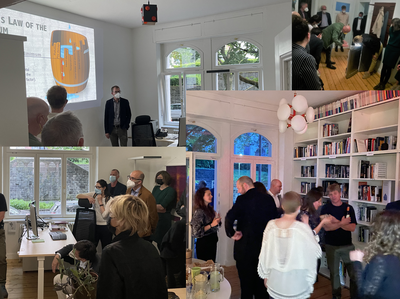
|

|
|
Zum Auftakt des Planetary Scholars & Artsists in Residence Programms begibt sich das Panel-Team zusammen mit einer Kleingruppe Studierenden in den Rosbacher Stadtwald – das Ergebnis der Feldarbeit sind die Bohrkernproben von vierzig Buchen. Die Dendrochronologin Claudia Hartl untersucht im Zuge ihres Fellowship Projekts „Jahrring-Berichte zum Waldsterben“ die Vitalität sowie die Reaktionen gesunder sowie absterbender Buchen auf Trockenjahre oder Extremwetterereignisse. Dank der tatkräftigen Unterstützung Lea Schneiders (Institut für Geografie, JLU) sowie ihrer Studierendenden finden nun ~12,000 Jahrringe den Weg in Claudia Hartls Langzeitstudie. Zeigte sich das Aprilwetter zwar nicht gerade von seiner freundlichsten Seite, so war die Feldarbeit dennoch ein besonders lehrreiches sowie denkwürdiges Ereignis. Über die Vorgehensweisen der Bohrkern-Entnahme hinaus lernte das Team vieles über die vielfältigen Anwendungsbereiche der Jahrring-Forschung. Diese reichen von der Herkunftsbestimmung von Baumaterialien, über die Datierung und Zertifizierung von Kunstwerken oder Musikinstrumenten, bis hin zur heute verbreiteten Erforschung der Baumarteneignung oder des klimatischen Wandels. In den Jahrringen lassen sich lokalräumlich ausgeprägte, planetare Phänome identifizieren - von Hitzeperioden bis hin zu Weltkriegen - sodass deren Auswirkungen auf das Baumwachstum nachvollziehbar werden. Darüber hinaus bieten die Bohrkernproben allein einen faszinierenden Anblick. Die Buchen reagieren auf die Entnahme ihrer wertvollen Kerne durch chemische Barrieren um die Bohrstellen und sollten die kurze Prozedur gut verkraften, sodass ihre Vitalität im Sommer anhand ihrer vollständig ausgetriebenen Kronen noch genauer bestimmt werden kann. Mit Neuigkeiten über das einzigartige Muster der Jahrring-Abstände der beiden Buchenpopulationen im Rosbacher Stadtwald ist also in Kürze zu rechnen. |
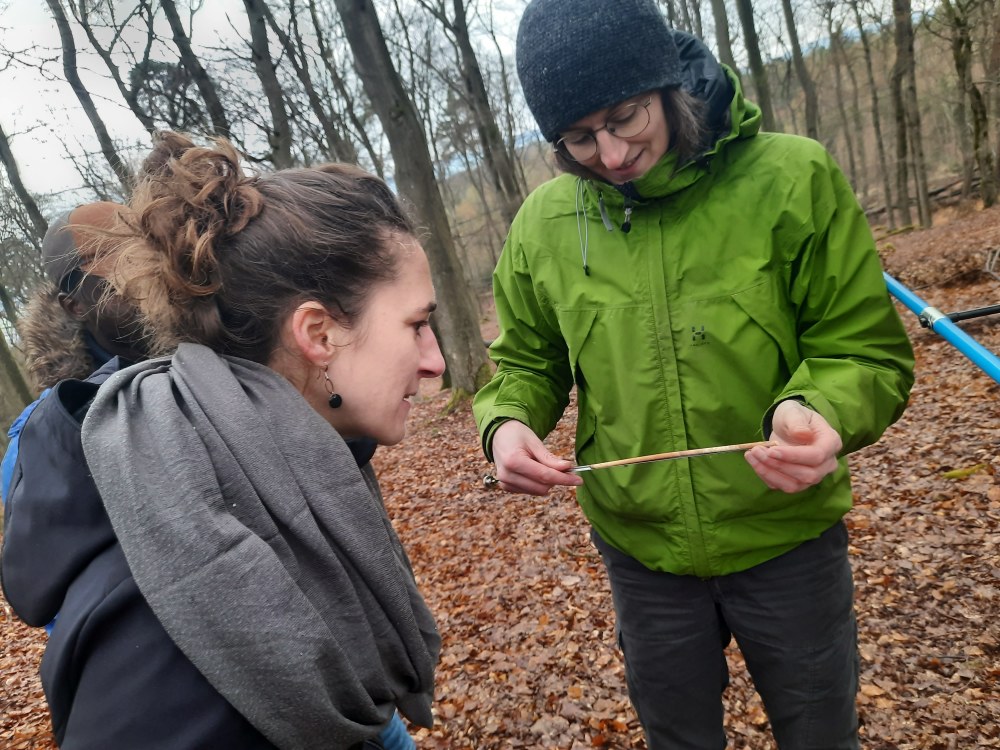
|






